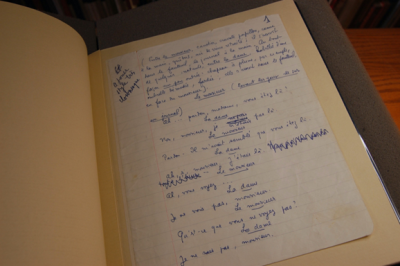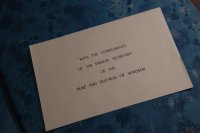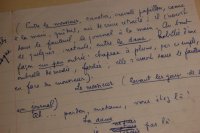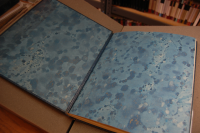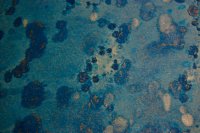The Alta Collection
IONESCO, Eugene (1909-1994)
Highly important manuscript of L’Impromtu pour la Duchesse de Windsor (1957) performed before Salvador Dali
$15000
Item Details
Blue morocco leather with blue marbling throughout
An autograph manuscript in French, signed “Eugene Ionesco.” Thirty-three lined pages, 6.75 x 8.5. A printed slip laid into the book reads, “With the compliments of the private secretary of the Duke and Duchess of Windsor.” Bound in blue morroco with blue marbled paper, marbled endleaves, and a marbled slipcase.
In May of 1957, the Duke and Duchess of Windsor attended an elite gathering at the Paris home of an Argentinian couple, Marcelo and Hortensia Anchorena (53, Avenue Foch, 16th Arrondisement). Only ten other guests were present; one was Salvador Dali. Eugene Ionesco had written a short scene for the occasion, with music composed by Pierre Boulez.
Eugene Ionesco was one of the leading playwrights in French avant-garde theatre in the 20th century. This humorous postmodern piece is essentially a dialogue about what type of play the characters—including Ionesco himself—should perform for the Duke and Duchess of Windsor. The theater historian Martin Esslin discusses the play in his classic study of Theatre of the Absurd (1961). Esslin describes the scene as “a very slight, but witty and utterly harmless party joke.” In one instance, the “lady of the house” [the Duchess of Windsor] asks Ionesco not to present “a sad play, one of those modern dramas like those by Beckett or Sophocles, which might make people cry.” Ionesco replies, “Sometimes, madame, comedies make people cry even more than dramas…the comedies that I write. When I want to write a tragedy, I make them laugh, when I write a comedy, I make them cry.”
Esslin also notes “a very amusing nonsense version of English history as seen by a Frenchman, and an equally characteristic sequence of semantic misunderstandings about spirits.” Tragedy, England, and alcohol: quite a piquant trio of topics to choose for the exiled Duke and Duchess. Dali remarked that “it was most moving.” Ionesco claimed that the Duke and Duchess appeared amused, although some newspapers reported that they had been offended.
The evening’s hosts, Marcelo and Hortensia Anchorena, were members of the stunningly wealthy Argentinian Anchorena family. “Fabulously wealthy, eccentric, absolute snobs,” Brigitte Benkemoun writes, “they prided themselves in inviting to their apartment avant-garde poets, writers, and painters.” In addition to buying art, they commissioned artists such as Braque, de Chirico, Jean Hugo, and Lucien Coutaud to paint the doors in their home; Picasso promised to paint a bathroom door but never delivered.
Catalogued by Dr. Molly G. Yarn
The Alta Collection
Eric Rasmussen
1004 Placid Creek Ct
Round Rock, TX, 78665
United States
Phone: 9252124132
Featured Catalogue
Visit Website
Specialities
Shakespeare, Early English Books, Manuscripts
More Information
Booth 5
Shipping and Returns
2-day FedEx, USPS, or UPS shipping